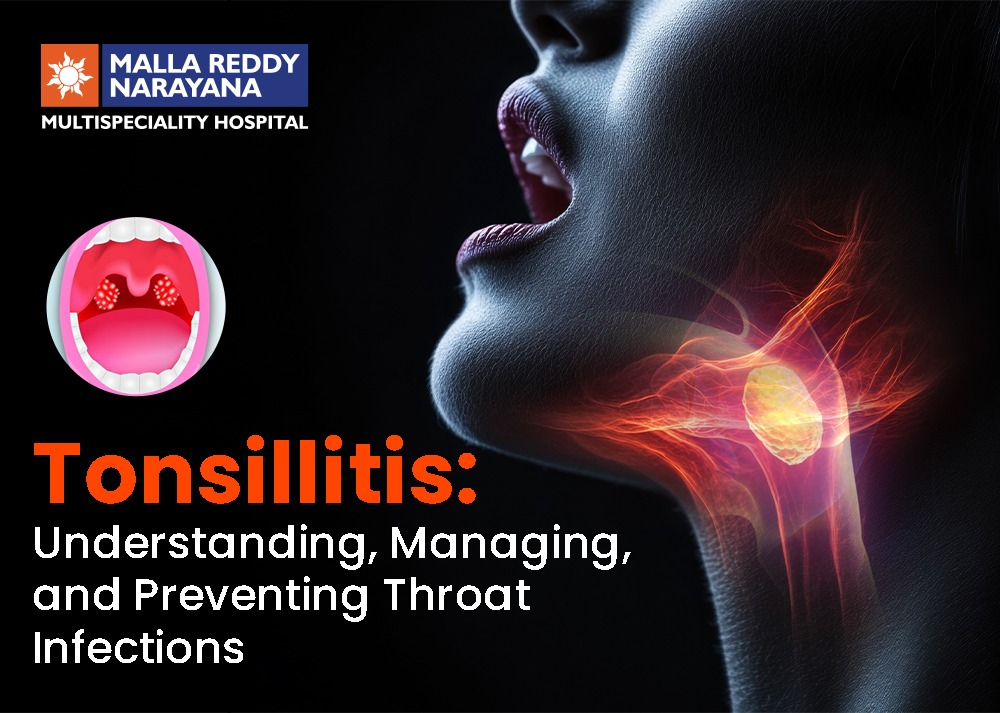Tonsillitis is one of the most common ENT conditions affecting children, especially between the ages of 3 and 15. It can significantly interfere with a child's daily activities, from attending school to sleeping well and eating comfortably. While it is often dismissed as a routine infection, untreated or recurrent tonsillitis can lead to serious complications or even require surgical intervention. At Malla Reddy Narayana Multispeciality Hospital, Dr. P Venu Gopal Reddy brings decades of expertise in identifying, treating, and preventing pediatric tonsillitis with an approach focused on both care and comfort.
What Is Tonsillitis?
Tonsillitis refers to the inflammation or infection of the tonsils, two small oval-shaped lymphatic tissues located at the back of the throat. These tonsils are part of the immune system and act as the body’s first line of defense against incoming germs through the mouth and nose. However, the same pathogens they trap can also infect them, causing them to swell, redden, and become painful. This leads to a range of symptoms that affect eating, talking, and breathing comfortably.
Why Is It Common in Children?
Tonsillitis is most frequently observed in children because their immune systems are still developing, and tonsils are more active during this stage of life. As children are exposed to new bacteria and viruses, especially in environments like schools or daycare centers, they become more vulnerable to throat infections. Over time, the tonsils lose their immune function and shrink, which is why tonsillitis is far less common in adults.
Causes of Tonsillitis
Tonsillitis can be caused by both viral and bacterial infections:
1. Viral Tonsillitis
- The most common cause in children
- Linked to viruses like influenza, rhinovirus (common cold), adenovirus, enterovirus, and Epstein-Barr virus
- Typically resolves on its own with supportive care.
2. Bacterial Tonsillitis
- Commonly caused by Streptococcus pyogenes, leading to “strep throat”
- Requires antibiotic treatment
- More likely to result in complications if untreated
When Does Tonsillitis Occur?
Tonsillitis can occur at any time of year, but tends to spike during:
- Monsoon and winter seasons – due to increased viral infections and moisture-driven microbial growth
- Post-rainy seasons – Contaminated water and poor hygiene
- Crowded settings – Such as schools, hostels, or camps, where infections spread quickly
Additionally, children who drink unfiltered or cold water frequently or share utensils are at greater risk.
Symptoms to Watch For
While every child may not express all symptoms, parents should be alert to:
- Sore throat or pain while swallowing
- Swollen and red tonsils
- White or yellow patches on the tonsils
- Fever
- Swollen lymph nodes in the neck
- Bad brea
- Headache and fatigue
- Irritability or loss of appetite in younger children
Stages of Tonsillitis
- Acute Tonsillitis – Short-term, lasts a few days to a week, often viral
- Recurrent Tonsillitis – Multiple episodes (more than 5–7 per year
- Chronic Tonsillitis – Persistent mild symptoms lasting weeks/months
- Peritonsillar Abscess – A Complication with pus formation beside the tonsil, causing severe pain and difficulty in opening the mouth
How Is Tonsillitis Diagnosed?
Our diagnosis includes:
- Throat examination using lighted tools
- Throat swab to test for streptococcal infection
- Blood tests (in specific cases) to detect systemic infection
- History analysis for recurrence and impact on quality of life
Dr. Venu Gopal Reddy evaluates each case with precision and explains the condition clearly to the parents to remove doubts and anxiety.
Treatment Options
1. For Viral Tonsillitis
- Rest and hydration
- Warm saltwater gargling
- Paracetamol or ibuprofen for pain and fever
- Throat lozenges and soft foods
2. For Bacterial Tonsillitis
- Full course of prescribed antibiotics
- Supportive care as above
- Avoiding contact with others until the fever subsides
3. For Recurrent or Chronic Cases
Tonsillectomy (surgical removal of tonsils)
Recommended when there are:
Recommended when there are:
- ≥7 episodes in 1 year
- ≥5 episodes per year for 2 years
- Sleep or breathing disturbances due to enlarged tonsils
- Safe day-care procedure performed under general anesthesia
Preventive Measures
- Encourage hand hygiene and avoid sharing bottles or utensils
- Provide boiled or purified drinking water
- Avoid excessive consumption of cold drinks or ice cream
- Maintain healthy immunity with a balanced diet and physical activity
- Keep children away from infected individuals during outbreak
- Avoid overcrowded or poorly ventilated areas when possible
When to See a Specialist
Parents should consult an ENT specialist if:
- A sore throat lasts more than 2–3 days
- The child is having difficulty swallowing or breathing
- High fever persists despite medication
- Recurring infections interfere with daily life or schooling
- Snoring or sleep disturbances are observed regularly
Expert ENT Care at Malla Reddy Narayana Multispeciality Hospital
Our ENT department is equipped with advanced diagnostic tools, pediatric-friendly care systems, and a multi-disciplinary team. Dr. P Venu Gopal Reddy, Senior Consultant – ENT, MBBS, MS, Fellowship in Skull Base Surgery, brings over 13 years of experience in treating complex and recurrent ENT conditions in children. His expertise includes microlaryngeal surgeries, endoscopic procedures, and coblation-assisted tonsillectomy, offering faster recovery and less post-op discomfort.
Parents are guided throughout the treatment process from understanding the condition to deciding on medications or surgical steps with complete transparency.
Conclusion
Tonsillitis in children, though common, should never be ignored, especially when it is recurrent or severe. With the right care, diagnosis, and when needed, surgical support, children can recover quickly and lead a healthy, energetic life. At Malla Reddy Narayana Multispeciality Hospital, with specialists like Dr. P Venu Gopal Reddy, families receive the kind of care that prioritizes comfort, safety, and lasting relief.
Tonsillitis in children, though common, should never be ignored, especially when it is recurrent or severe. With the right care, diagnosis, and when needed, surgical support, children can recover quickly and lead a healthy, energetic life. At Malla Reddy Narayana Multispeciality Hospital, with specialists like Dr. P Venu Gopal Reddy, families receive the kind of care that prioritizes comfort, safety, and lasting relief.




